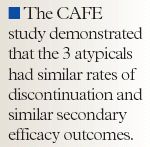- Safety & Recalls
- Regulatory Updates
- Drug Coverage
- COPD
- Cardiovascular
- Obstetrics-Gynecology & Women's Health
- Ophthalmology
- Clinical Pharmacology
- Pediatrics
- Urology
- Pharmacy
- Idiopathic Pulmonary Fibrosis
- Diabetes and Endocrinology
- Allergy, Immunology, and ENT
- Musculoskeletal/Rheumatology
- Respiratory
- Psychiatry and Behavioral Health
- Dermatology
- Oncology
From the ECNP Congress: Head-to-head study confirms atypical antipsychotic efficacy equivalence
Quetiapine (Seroquel, AstraZeneca), olanzapine (Zyprexa, Lilly), and risperidone (Risperdal, Janssen) are equally effective in patients experiencing first episode psychosis, according to data presented in late October during the Breaking News session at the European College of Neuropsychopharmacology (ECNP) Congress.
Quetiapine (Seroquel, AstraZeneca), olanzapine (Zyprexa, Lilly), and risperidone (Risperdal, Janssen) are equally effective in patients experiencing first episode psychosis, according to data presented in late October during the Breaking News session at the European College of Neuropsychopharmacology (ECNP) Congress.
The CAFE (Comparison of Atypicals in First Episode Psychosis) study is the first to examine the comparative effectiveness of quetiapine, olanzapine, and risperidone in first-episode psychosis patients, as measured by all-cause treatment discontinuation. At week 52, the all-cause treatment discontinuation rates were similar between medications (70.9%, 68.4%, and 71.4% for quetiapine, olanzapine, and risperidone, respectively). However, significantly more olanzapine patients (80%) experienced weight gain of 7% or more relative to baseline, compared with 57.6% of risperidone and 50% of quetiapine patients (P=.01 for olanzapine vs quetiapine).
Commenting on the data, Henry Nasrallah, MD, Professor of Psychiatry, Neurology, & Neuroscience at the University of Cincinnati Medical Center, said that the CAFE study demonstrated that the 3 atypicals had similar rates of discontinuation and similar secondary efficacy outcomes. "These data confirm that quetiapine, olanzapine, and risperidone show equivalent efficacy in the treatment of first episode psychosis," Dr Nasrallah said.

The overall discontinuation rate observed among patients in this study reflects the complexities in treating people with schizophrenia, which affects about 1% of the population. "The study reinforces the need for a variety of medications so that clinicians can find the best treatment option, with optimal risk benefit ratio, for each patient. It also highlights how important patient-physician communication is in maximizing treatment success," said Dr Nasrallah.
Other data presented at ECNP confirm that quetiapine (final mean dose 709.8 mg/d) and risperidone (final mean dose 8.1 mg/d) are equally effective in the acute management of schizophrenia; however, quetiapine appears to offer tolerability benefits. The results of the acute phase of the TESIS study (Tolerability and Effectiveness of quetiapine In Patients with Schizophrenia) demonstrated that patients responded similarly to both medications: 66.3% of quetiapine and 57.1% of risperidone patients showed at least 40% improvement of Brief Psychiatric Rating Scale scores. More patients experienced extra-pyramidal side-effects (inability to control muscle movements) with risperidone than with quetiapine: rigidity (25.7% vs 3.8%, P<.001), hypokinesia/ akinesia (29.1% vs 6.6%, P<.001), tremor (22.7% vs 3.4%, P<.001), and akathisia (12.7% vs 1.9%, P<.001). In addition, quetiapine had less impact on male sexual functioning; diminished sexual desire (18.8% vs 6.7%, P=.012) and erectile dysfunction (21.1% vs 5.9%, P=.003) were more common in males treated with risperidone compared with quetiapine.
